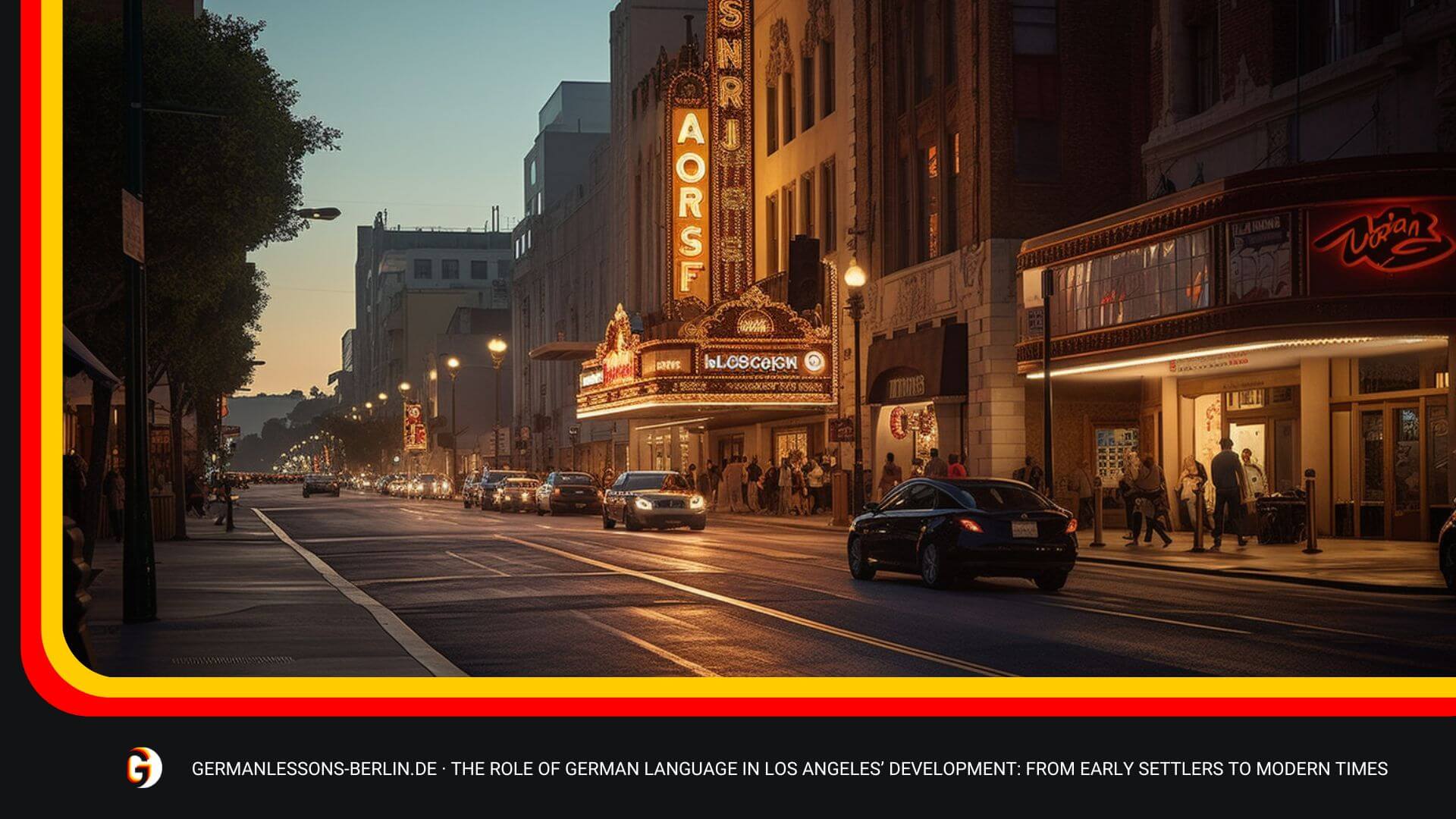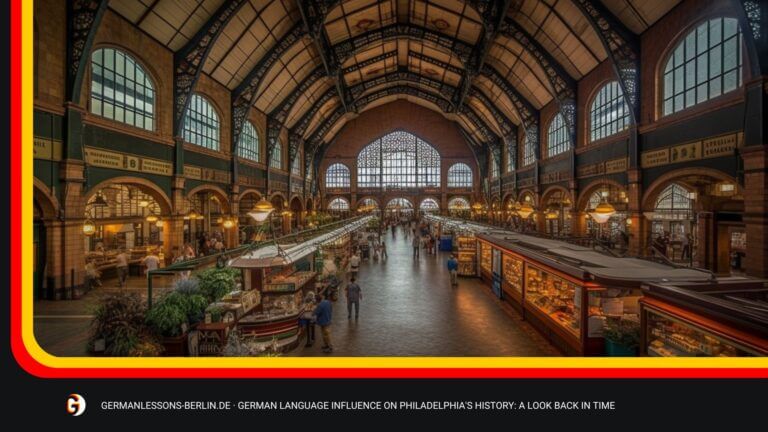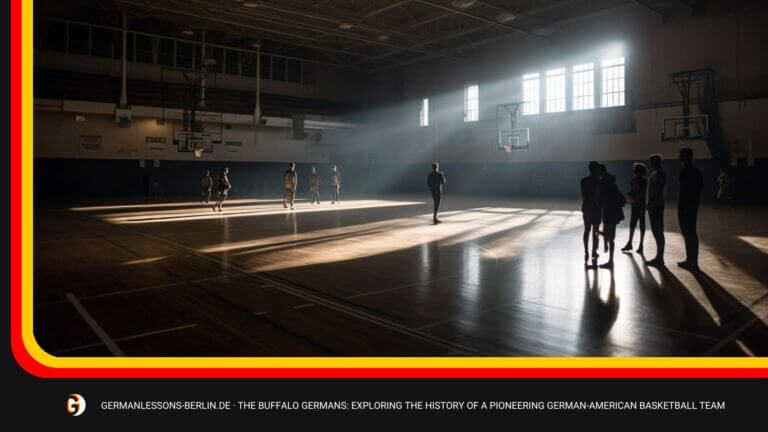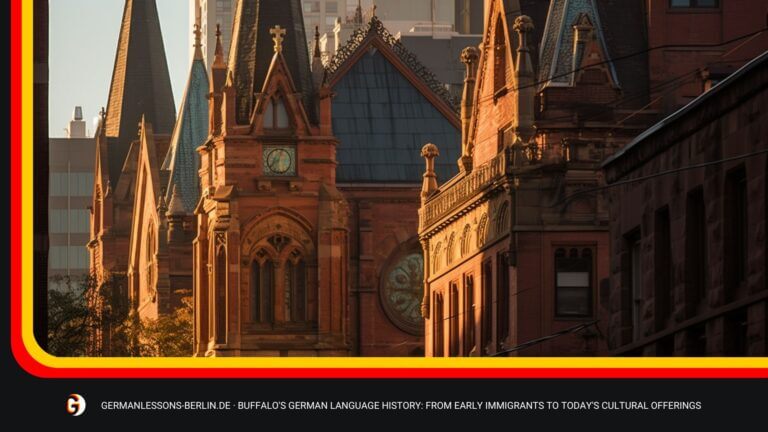The German language has been an integral part of the development and evolution of Los Angeles since its early days as a settlement. From the first settlers to the modern day, it has helped shape the culture and identity of this lively city. As we explore the role of German in L.A.’s history, let us look back at how its influence has changed over time – from humble beginnings to far-reaching effects on today’s society.
In the late 1700s, when Spain began colonizing what is now known as California, they were joined by immigrants from all walks of life – including those who spoke German. These brave pioneers brought with them their language, customs, and traditions, which had a lasting impact on the region’s cultural landscape even up until today.
Fast forward to present times; you may be surprised to learn that there are still many traces of the German language throughout Los Angeles – from street names to local businesses. Despite being primarily overshadowed by other languages like English or Spanish, its presence persists and continues to play an essential role in developing our great city for future generations.
Table of Contents
Historical Background
The German language has had a significant role in the development of Los Angeles since its earliest history. The first settlers to arrive in the area were German immigrants, and their impact is still felt today. Immigration patterns show that they arrived as early as 1781 when Spanish explorers discovered California and set up regional missions. These early settlers played an integral part in shaping what would become modern-day L.A., with contributions including establishing businesses, founding townships, and building roads.
The German language was also crucial for trade between local Californians and the growing number of foreign visitors arriving from Europe. This helped foster economic relationships, allowing for more opportunities for growth and prosperity within the city limits. As more people began to move into Los Angeles, so too did their culture – mainly through educational institutions such as schools and universities where students could learn both English and German languages. This created a vibrant cultural exchange that enabled new ideas to be shared among different communities across the city.
Today, the German language remains an essential element of life in L.A.; it can be seen everywhere, from street signs to conversations at restaurants or cafes. Though many other languages now exist alongside it – such as Spanish, Chinese, Korean, and Tagalog – its influence on the development of this great city continues to remain strong. From its humble beginnings centuries ago to its current status as one of America’s most populous cities, it is clear that without the valuable contribution made by Germany’s original settlers, Los Angeles may never have grown into what it is today.
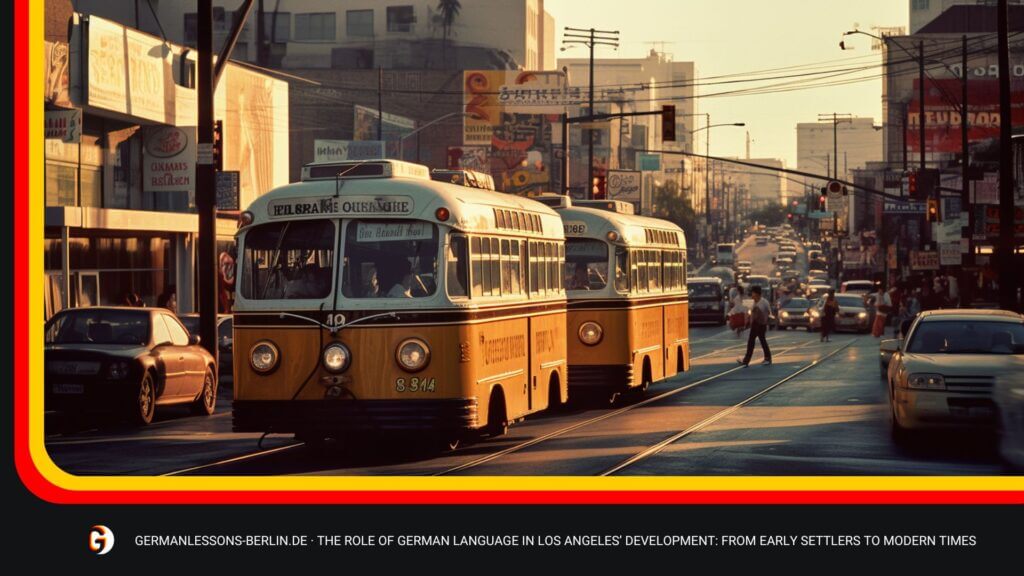
German Immigration To Los Angeles
German immigration to Los Angeles has significantly contributed to the city’s development. From the early settlers of the 19th century, who made up an essential part of the population in what was then called El Pueblo de Nuestra Señora La Reina de Los Ángeles, to modern times where their influence can still be felt, here are three critical ways that German immigrants have shaped this vibrant city:
- German-Settlers-Los-Angeles: The influx of German settlers into Los Angeles began in 1841 when Johann Avila arrived with his family and established the first successful vineyard in California. This marked the start of waves of migration from Germany and other parts of Europe which would continue for decades until World War I. By 1900, Germans had become one of the largest ethnic groups in L.A. and were responsible for landmarks such as Chinatown and Echo Park.
- German-Population-Los-Angeles: As more German immigrants settled in L.A. during the late 1800s and early 1900s, they helped drive economic growth through various industries, including brewing, tanning, shipping, and printing. Additionally, some of these new arrivals opened businesses like hotels and restaurants, which helped serve tourists visiting Southern California at the time. This resulted in a significant increase in L.A.’s German population over time – by 1940, it had grown to nearly 23%, according to census data!
- Los Angeles-German-Heritage: Despite being primarily assimilated into American culture since WWII, Germans left behind a lasting legacy on Los Angeles that is still visible today. For instance, there is still a sizable concentration of German speakers living near Downtown; numerous streets bear names derived from German words; several unique buildings featuring traditional Bavarian architecture exist across town; plus countless festivals celebrating Oktoberfest each year!
It cannot be denied that German immigrants played an integral role in shaping the physical landscape of present-day Los Angeles and its cultural identity along the way – something we should all take pride in recognizing!
Cultural Influence Of the German Language In The City
The German language has had a lasting influence on Los Angeles since the city’s early days. From its beginnings as an immigrant community, the presence of German culture and language in L.A. was palpable. As more and more Germans moved to the area, their linguistic heritage began to shape the development of this bustling metropolis.
German immigrants brought words and traditions that have become integral to today’s thriving cultural landscape. The cuisine of these settlers left a permanent mark; sausages, pretzels, pastries, and other specialties are still popular dishes throughout the region. Similarly, they introduced new forms of entertainment, such as cabarets and operettas, which became part of the vibrant nightlife of Los Angeles.
The impact of German-speaking immigrants is further evident in many aspects of religion, media, and education. Numerous churches were founded by German missionaries who left behind a legacy that continues to be celebrated today. Meanwhile, newspapers written in German were published for over fifty years, providing content for residents and those abroad who sought news from home. Finally, educational institutions like UCLA feature courses taught in German, emphasizing its importance for academic growth and understanding within this diverse cityscape.
It is clear then that through their artistry, industry, and innovation, German settlers made a significant contribution to L.A.’s history and development – one that remains visible even today.y
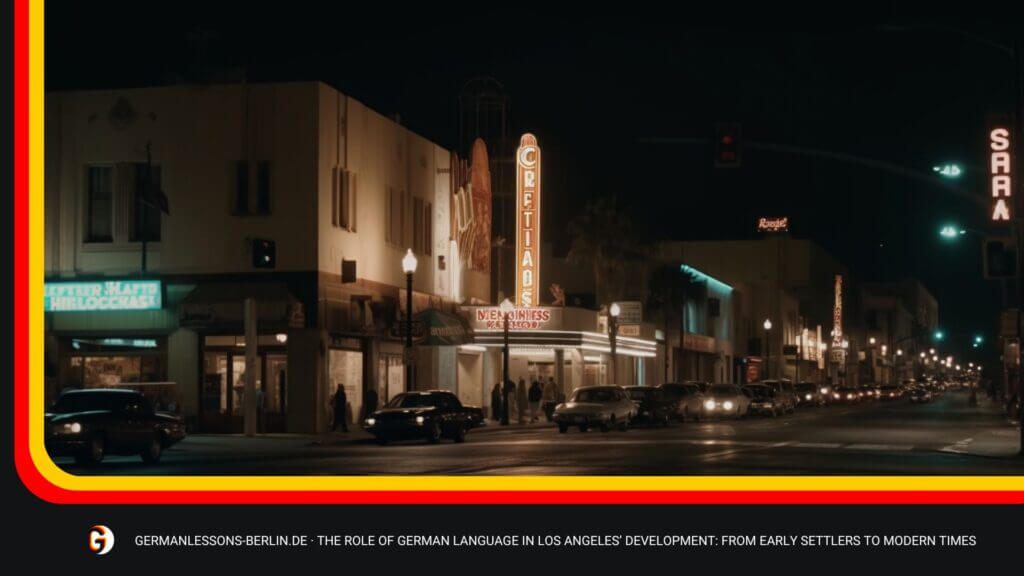
Education And Community Development
Since the earliest days of German settlers in Los Angeles, the German language has significantly influenced the city’s development. Unsurprisingly, this unique linguistic tradition heavily influences education and community development programs. For instance, there are many opportunities for students to learn German through language instruction classes and other language-learning resources. Additionally, more immersive approaches, such as language immersion classes, provide an even deeper understanding of the intricacies of speaking German.
These educational initiatives have helped form strong bonds among local communities and those with ties to Germany or other German speakers worldwide. Such connections foster greater cultural understanding between different groups within Los Angeles while encouraging appreciation for diversity in all its forms. Furthermore, these activities help create a more inclusive atmosphere where everyone feels welcome and accepted regardless of their background or nationality.
German-language education and related community development programs play an essential part in shaping the culture and identity of Los Angeles today. From early settlers who brought their native tongue with them to modern classrooms full of eager learners, it is evident that this distinct linguistic heritage continues to thrive throughout the city. As we look forward into the future, one can only hope that further efforts will be made to ensure its preservation and continued contribution towards making L.A. an ever-more vibrant place to live.
Popularity Of The Language Today
In modern times, the German language in Los Angeles has retained its popularity among native and non-native speakers. Despite the influx of other languages, it remains one of the most widely spoken tongues in the city. One area where this is evident is within the education sector – both public school systems and universities offer German language courses to their students. This allows those who wish to learn or improve their existing knowledge to do so quickly. Furthermore, several private classes are available, and various organizations are dedicated to helping German language learners further develop their skillset.
Additionally, many employers now recognize the value of being able to speak multiple languages fluently; therefore, they often seek applicants with proficiency in German for roles requiring high levels of communication. As such, employment opportunities for individuals who speak English and German have increased significantly over recent years. Even more excitingly, these jobs may not necessarily be limited to positions related directly to language learning or teaching but can span across industries ranging from finance to healthcare.
Overall, it is clear that although some changes have occurred since early settlers first arrived in Los Angeles, bringing with them the German language centuries ago, today, it still holds relevance and importance amongst locals and visitors alike. It continues to offer unique benefits, from avenues for cultural understanding to potential career advancements – making it an invaluable asset for anyone living here.
Working Languages In The City
German-speaking people have left a lasting impact on the development of Los Angeles over its history. Since settlers first arrived in the city, German has been an integral part of what would become one of America’s most populous cities. As such, it is no surprise that it played a pivotal role in shaping which languages were used for working and communicating within the city.
In the mid-19th century, German was among the primary language spoken by many new arrivals to Los Angeles from Europe. This influx of German speakers was reflected in local newspapers and other public documents produced at this time. At this point, English had yet to emerge as a dominant language in California; Spanish still held a strong influence due to its being established before American rule. Thus, German remained an essential working language alongside Spanish and English in Los Angeles.
By the turn of the 20th century, however, English had cemented itself as the primary language spoken throughout the state – eventually becoming declared official under Article XVI Section 4 of the Constitution of California in 1879. Despite these developments, though, German continued to be widely used amongst those living in Los Angeles until World War I. During this time, an anti-German sentiment arose across much of North America. This led to decreased usage of German within Los Angeles and ultimately resulted in its decline as a viable working language for communication purposes in the city.
While far less prominent today than it once was, German remains influential within Los Angeles even now, with numerous cultural events each year celebrating its past presence within the city’s development – evidence enough that it will always be remembered despite waning numbers speaking it today.
Impact On Businesses
The German language has significantly influenced businesses throughout Los Angeles since its earliest days. During the 19th century, most of the early settlers in Los Angeles were German immigrants who brought their native language with them. This enabled them to set up successful businesses in their new home and contribute significantly to the growth of Los Angeles’ economy.
Since then, many more Germans have arrived in L.A. and established various businesses that rely heavily on the German language. From small stores selling traditional German products to large companies operating at an international level, these businesses have become essential players in Los Angeles’ vibrant economic landscape.
| German-Businesses | Los-Angeles-German | German-Language-Business |
|---|---|---|
| Bakery | Weiss Brothers | Adidas |
| Butcher | Auerbach’s | Volkswagen Group |
| Delicatessen | Schmidt’s | Siemens |
Today, numerous German-owned businesses are scattered all over Los Angeles, from Downtown to Hollywood and beyond. These include popular restaurants like Der Wolfskopf and Golden Harbor Cafe, well-known shops like Strauss & Co., and even luxury car dealerships like Porsche Beverly Hills. All these establishments use the German language in their day-to-day operations and employ many locals who speak it fluently.
This rich mix of local culture and foreign business opportunities makes Los Angeles so attractive for entrepreneurs looking for success in a new country and customers seeking out unique experiences. Thanks to this dynamic combination, we can enjoy great food, exciting shopping trips, or take part in some incredible experiences while living here – all made possible by our shared appreciation of Germany’s glorious language!
Role In Tourism
The German language has played an integral role in developing tourism in Los Angeles. From the early days of settlement, when Germans were among the first immigrants to arrive and establish their presence, until today’s multi-cultural cityscape, German influences can be seen all over L.A. Today, one of the main draws for tourists is a celebration of this history through museums, tours, and events that highlight its rich cultural heritage.
Here are three compelling reasons why the German language should be highlighted as part of any L.A. tourist experience:
- German-tourism – Tourists can explore various sites throughout L.A. that reflect Germany’s past involvement with the area, including historical buildings and monuments related to immigration or industry, such as breweries, butchers, or bakeries. Additionally, they can take guided tours led by local experts who share stories about how Germans have shaped Los Angeles’ culture and identity.
- Los Angeles Tourism – Tourism in Los Angeles continues to grow due to its unique mix of attractions, from Hollywood studios to beaches and theme parks, which draw visitors from around the world. The addition of celebrating German influence adds another layer to exploring the city and provides interesting perspectives on its evolution over time.
- Language-Tourism – Visitors interested in learning more about German culture and language can find plenty of opportunities, from attending classes at community colleges or universities to private instruction offered by native speakers providing authentic experiences for travelers looking for deeper insights into L.A. life beyond just sightseeing.
Incorporating appreciation for German contributions into Los Angeles’ tourism sector helps connect locals and visitors while preserving a piece of history that might otherwise be forgotten. By understanding these connections between past communities and present-day cultures, we gain a greater appreciation for our roots and those shared amongst us all, making it possible to create stronger bonds no matter where we come from or what language we speak.
Media Representation
The role of the German language in the development of Los Angeles is apparent even today. It has been a part of the city’s media representation since its earliest days when settlers first brought their culture and language to this new land. Today, it can be seen everywhere, from television programs and radio stations to newspapers, magazines, and websites dedicated solely to promoting German-language content.
German-language media has long been integral to Los Angeles’ cultural fabric. From local newspapers published in both English and German during the 19th century to modern radio shows that discuss current events with a focus on Germany or Europe as a whole, German language media plays an essential role in informing Angelenos about global developments while also keeping them connected to their heritage.
While much progress has been made in ensuring that German-language media is appropriately represented within Los Angeles’ diverse population, there are still areas where improvement could be made. With more investment into German-language media outlets like KCRW Radio Berlin (the only all-German station available worldwide), Los Angeles can continue to strengthen its ties to its European roots while maintaining a current level of relevance for those seeking a deeper understanding of international affairs. As such, it is clear that the influence of the German language will remain prominent in shaping Los Angeles’s media landscape for years to come.
Preservation Efforts
German language preservation efforts in Los Angeles date back to the early 1900s when German immigrants began settling in California. Since then, various initiatives and organizations have been dedicated to preserving and promoting the use of the German language within the city. This table illustrates the significant milestones that propelled these efforts:
| Milestone | Year | Impact |
|---|---|---|
| Founding of Deutsche Gesellschaft von Los Angeles (DGLA) | 1912 | Established cultural clubs for Germans living in L.A. |
| Reinstatement of German classes in public schools | 1951 | Enabled students to learn German as a foreign language |
| Creation of Goethe Institut | 1980 | Provided educational resources related to Germany’s culture and language |
The founding of DGLA allowed native speakers, newcomers, and their families to connect through organized events such as lectures, theatrical performances, and newspaper publications. This allowed them to maintain strong ties to their heritage while still assimilating into American society. In addition, its members promoted awareness about the importance of learning and speaking the German language by advocating for the reinstatement of German classes at local public schools. Adopting this initiative enabled the next generation of Germans born or raised in Los Angeles to access quality education from kindergarten through high school.
In recent years, several foundations have emerged to help revive interest among younger generations toward learning and conserving their ancestral tongue. Organizations like Deutschkurse LA offer free online lessons for those interested in quickly mastering basic conversational skills. There are also many libraries throughout Los Angeles stocked with books written exclusively in German which can be borrowed or purchased outright. These initiatives demonstrate how far German-language conservation has come since its beginnings over 100 years ago – resulting in a thriving community actively revitalizing its linguistic roots even today.
Frequently Asked Questions
How Does The German Language Influence The City’s Economy?
Throughout Los Angeles’ history, German-speaking citizens, immigrants, and businesses have significantly influenced its economy. From early settlers to modern times, the city’s connection with this language has provided numerous advantages for individuals and corporations. As such, it is essential to consider how exactly the German language has impacted L.A.’s development in terms of economic growth.
At first glance, one can quickly identify many prominent German-speaking communities throughout Los Angeles that contribute significantly to its economy. For example, some notable industries include engineering firms and automotive repair shops owned by German-speaking entrepreneurs who often employ other residents who speak the language. In addition to these businesses, various cultural institutions are dedicated to preserving the German language and promoting related activities within L.A. society, thereby providing further opportunities for economic prosperity.
Furthermore, having access to native speakers of the language gives companies based in Los Angeles an advantage when trading or engaging with their international counterparts who may not be fluent English speakers. By leveraging their knowledge of German and English, they can facilitate smoother communication and potentially foster better relationships between entities from different cultures. This is especially beneficial given today’s increasingly globalized world, where communicating effectively across multiple languages is essential for success.
It is clear then that understanding the role the German language plays within Los Angeles’ economy provides us with insights into how this ancient tongue continues to impact people living in the City of Angels even today – from those employed by local businesses up to corporate organizations operating at a larger scale internationally.
What Kind Of Businesses has been Established By German-Speaking Immigrants?
For centuries, German-speaking immigrants have had a significant impact on the businesses of Los Angeles. From early settlers to modern times, these individuals have established many successful companies in the city. By examining the history of this community and its contributions to Los Angeles’ economy, we can gain insight into how their language has influenced the city’s development.
German-speaking immigrants began settling in Los Angeles during the mid-19th century. As they arrived, they brought valuable skills and knowledge that allowed them to establish numerous businesses throughout the city. Among these were restaurants, grocery stores, bakeries, butchers, and other shops selling goods from Germany or made by German artisans. Many of these businesses thrived and provided employment opportunities for members of the local German immigrant population.
In addition to traditional outlets, German-speaking immigrants started more specialized enterprises such as bookbinding services, wineries, and beer gardens. These establishments proved popular among locals who enjoyed socializing over a good drink or exploring new books written in their mother tongue. The contribution of these businesses helped create an atmosphere of cultural exchange between Germans and Americans alike in Los Angeles at the time.
The legacy left behind by early German settlers continues to be seen today in various parts of Los Angeles, where descendants of those immigrants own thriving businesses. This demonstrates the lasting economic influence of German speakers on L.A. culture and how important it is for people to stay connected with their heritage.
Are There Any German-Speaking Communities In Los Angeles?
Since the city of Los Angeles was first established, German-speaking immigrants have been a significant part of its population. To this day, many families still reside in areas where their native language is preserved and celebrated. There are quite a few communities throughout Los Angeles that are home to people who speak German as their primary language.
These individuals have left an indelible mark on the culture and history of L.A. through various establishments such as restaurants, stores, clubs, and churches. They also provide unique perspectives on important issues like immigration reform and cultural influences within the city. Through language preservation efforts, these immigrant families can ensure that their heritage remains alive in the City of Angels for generations to come.
In addition to providing a sense of community for those who share similar backgrounds, German-speaking communities in Los Angeles can also offer insight into how language has shaped the area’s development over time. By examining local businesses started by German immigrants and exploring any traditions or customs they may have brought with them from Europe, we can gain valuable insights into how our city has evolved since it was founded centuries ago.
Does The German Language Have Any Presence In The Media In Los Angeles?
The German language has always impacted the development of Los Angeles. But does it have any presence in the media today? This article will explore the influence of past and present German-language media on L.A.’s cultural landscape.
It is important to note that there were pockets of German-speaking communities throughout Los Angeles County for many years. Some areas, such as Long Beach, still retain a strong sense of its German roots. As early settlers brought their own culture and language, these communities began to create newspapers, magazines, and other forms of communication within those enclaves. This was a way to share news and events among themselves while providing access to local businesses, which could be found in advertisements inside these publications.
Today, however, there is much less activity when it comes to German-language media in L.A. – even though there are sizable populations of people who speak or understand the language. Despite this reality, one can find a few examples scattered around the city, from radio shows dedicated exclusively to conversing in German to small bookstores selling titles written in that tongue. Although not as prominent as before, evidence suggests that the German language retains a certain level of presence within various aspects of Los Angeles’ media outlets.
Given its relatively small scale compared with English-language offerings, it may seem difficult for anyone interested in engaging more deeply with this part of our collective heritage. Nonetheless, by exploring existing resources, we can gain insight into how Germans have contributed to shaping L.A.’s unique identity over time and appreciate anew what they continue to bring us today.
How Has The Preservation Of The German Language Been Maintained In Los Angeles?
The preservation of the German language in Los Angeles has been an ongoing process from its early settlers to today’s modern times. Throughout this period, German-speaking communities have maintained their linguistic identity despite changes over time and external influences. To understand how this has occurred, it is essential to look at the historical context and the current trends that have contributed to its success.
In earlier centuries, a large influx of immigrants who spoke German as their primary language arrived in Los Angeles. This created a vibrant culture with many distinct dialects developing among different groups. As the city grew, these minority languages were gradually lost due to English becoming more prevalent and widely accepted by the population. However, certain pockets of German speakers remained dedicated to maintaining their native tongue while passing down traditions such as traditional songs and stories through generations. These efforts enabled continuity for those wishing to preserve their cultural heritage and kept alive a link between past and present Germans living in L.A.
Today, although most people in Los Angeles speak English primarily or exclusively, there are still active German-speaking enclaves that continue to thrive throughout the city. The presence of organizations such as Deutsche Schule Los Angeles (DSLA) provides an education system that gives students access to courses taught entirely in German if they so desire; likewise, clubs like Deutsches Haus promote events that celebrate Germany’s rich cultural history amongst Angelenos both young and old alike. Additionally, numerous media outlets, including radio stations, specializing in broadcasting news reports and interviews conducted solely in German – thus providing further opportunities for individuals seeking out content tailored explicitly towards them within a globalized world that often feels overwhelming without one’s native language being accessible on demand.
It is clear then that even though more significant shifts may occur overtime – namely, English replacing other languages altogether – initiatives led by passionate advocates can ensure that linguistic diversity is not entirely erased but instead celebrated, allowing everyone, regardless of background or circumstances, an equal opportunity to express themselves freely without having any barriers based on linguistics imposed upon them when doing so.
Conclusion
The German language has dramatically shaped Los Angeles, and its influence can still be seen today. From early settlers to modern times, this impact has had a lasting effect on the city’s culture and economy. Businesses founded by German-speaking immigrants have flourished across Los Angeles, with some having become iconic landmarks in their own right. There are also numerous communities where people continue to speak German, ensuring it remains alive in the city for generations to come. Additionally, various media outlets regularly feature content in both English and German, highlighting how important this language is to the L.A. landscape.
The contribution of German speakers throughout history has made an invaluable contribution to Los Angeles’ development over time. As such, I believe it’s essential that we work together to ensure these traditions remain strong at all levels of society in the future so that future Angelenos can appreciate what our predecessors brought to this great metropolis many years ago. By supporting organizations dedicated to preserving and teaching the German language and recognizing those who have done much to keep it alive here in Los Angeles, we can ensure that Germany will always play an integral part in shaping our beloved city’s vibrant identity!
Some external resources are available to learn more about the role of the German language in Los Angeles’ development. The German-American League of Los Angeles, the German Studies at USC, and the German American Chamber of Commerce California are all organizations that celebrate and promote Los Angeles’ German-American heritage. Additionally, the city hosts many German cultural events throughout the year, including the German Currents Film Festival and the L.A. Oktoberfest. By exploring these resources and attending events, one can gain a deeper understanding of the historical and cultural significance of the German language and culture in Los Angeles’ development.

